MOVIE REVIEW – My childhood favorite hobby, gombfoci (or as it’s called here, “sectorball”), comes to life in The Rebound, a quintessential Hungarian comedy directed by Csaba Vékes. Set in a small provincial town, two teams of middle-aged, washed-up men face off both on the miniature plastic pitch and in their everyday lives, battling each other with the same gritty determination familiar to anyone acquainted with Hungarian reality. The film stands out not just for featuring Péter Scherer and Zoltán Mucsi, two of Hungary’s most well-known comedians, but also for including Dallas star Patrick Duffy. The real question for me, though, was whether this star-studded production could live up to the bar set by Hungarian classics like The Witness, We Never Die, Glass Tiger, or Dollybirds, or if it would fall short of my expectations.
According to Wikipedia, gombfoci has supposedly been around since the early 20th century. What I know for sure is that in the late ’70s and early ’80s, gombfoci sets were available in most toy and tobacco shops. My mother used to buy me the top teams, and I’d play out World Cup matches by myself. I remember the small round plastic disks representing players sold in funnel-shaped holders, with tiny plastic goals and balls that let you feel like you were right on the field if you had enough free floor space. By the late ’80s and early ’90s, the game had mostly disappeared, and I don’t recall seeing anyone play it during school breaks.
The film, however, focuses not on simple gombfoci but on its “professional” variant, sectorball, which has different rules from the traditional game. I won’t bore you with the details—look them up on Wikipedia—but the movie does share a few of these rules as it goes on.
Everyday Disappointments
What’s fascinating about this recognized sport is that ordinary people with average physical abilities can compete. You don’t need to be in peak shape to play, and sectorball remains quite popular in rural Hungary, with tournaments even held today, like the one in Maroslele. This makes the film’s modern-day setting feel authentic, and when you look at the faces on the Sectorball website, it’s clear that the weathered players often come straight from local pubs.
These “athletes” are not just dedicated—they’re fanatics, pulling out all the stops to win and secure a spot at the European Championship in Greece. Many even dedicate their entire lives to this “sport.” One such fanatic is Kálmán, portrayed brilliantly by Péter Scherer. His performance is undoubtedly the strongest aspect of the film, carrying the entire production on his back. Zoltán Mucsi also makes a brief but hilarious appearance as the passive-aggressive caretaker of the building where the sectorball is played, sabotaging the heroes at the worst possible moment and sparking the central conflict. I won’t spoil too much, but let’s just say that his actions force a crucial match to be replayed for a shot at the European Championship. It’s a shame Mucsi only plays a minor role, as I would have loved to see him as an opponent to Scherer’s team.
Patrick Duffy, best known for Dallas, doesn’t get much screen time either. He plays a Hungarian-born, U.S.-based millionaire who donates a hundred million forints to a local soccer team. Thanks to a clever trick by Kálmán’s son, Oszkár (played by Dezső Derzsi), the sectorball team ends up with the money instead. Duffy’s performance, honestly, doesn’t add much to the character—any older Hungarian actor could have done it, perhaps even better. It feels like Duffy’s casting was purely for the nostalgic value of his Dallas fame.
Forced and Over-the-Top Humor
While the cast is solid, and the humor works initially, the further the movie progresses, the more forced the jokes become. I think the creators aimed to make each character likeable and relatable (or at least Scherer’s team), but with the exception of Erika and maybe Oszkár, the characters’ pettiness makes it hard to root for anyone.
Most of the characters are taken to absurd extremes. For instance, the butcher threatens to grind up a puppy to achieve his goals, while Oszkár’s macho boss at work struts around naked after sleeping with a coworker, just to brag. Kálmán immediately blows the money on ridiculous things like lobster at a local hotel, where he books a luxury suite. Some jokes involving Kálmán’s idiotic teammates are repeated to the point of exhaustion. The twin brothers, Szilárd (László Katona) and Atti (Zsolt Fekete-Lovas), have an absurd recurring gag involving Barbie dolls that’s completely unbelievable and drags on far too long.
I understand that The Rebound aims to be a typically Hungarian comedy, but situational humor works best when it’s grounded in reality, and many of these over-the-top moments feel disconnected and contribute little to the main story. I would recommend that the director, screenwriter, and producers take a cue from György Szomjas’ best works (Wall Driller, Junk Movie, Gangster Film—the latter starring Scherer and Mucsi) or the Hungarian comedy classics I mentioned earlier. While The Rebound isn’t a bad film, it’s certainly a far cry from the high standards of those timeless hits.
-Herpai Gergely “BadSector”-
The Rebound
Direction - 6.2
Actors - 8.1
Story/Humor - 6.1
Visuals/Soundtrack - 5.8
Ambience - 6.2
6.5
FAIR
The Rebound is a typically Hungarian comedy that brings the world of gombfoci to life with a strong cast, but ultimately falls short of reaching the level of classic Hungarian films. While the story and humor work at the beginning, as the film progresses, it becomes increasingly forced, with certain jokes repeated to the point of exhaustion. Péter Scherer and Andrea Waskovics deliver standout performances that add significant value to the overall experience.

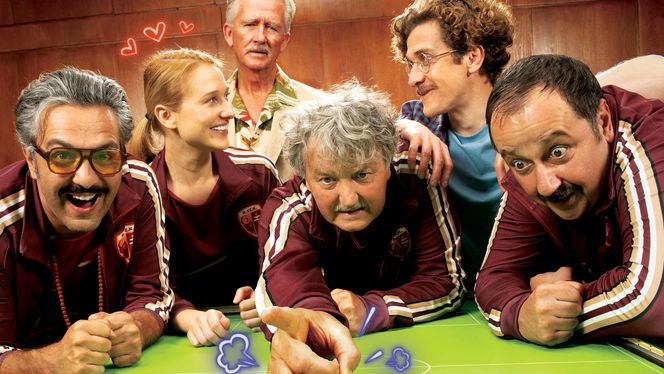
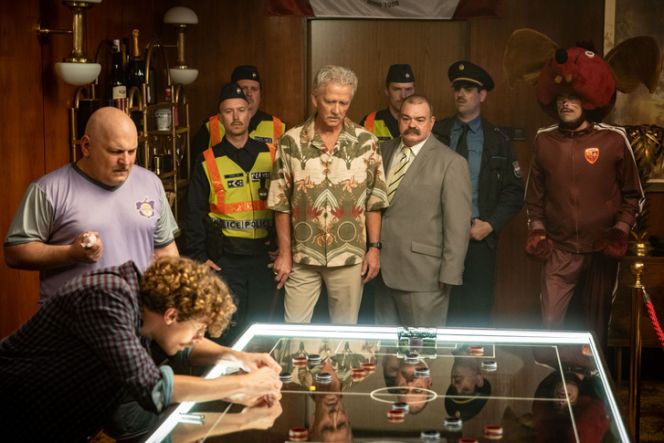






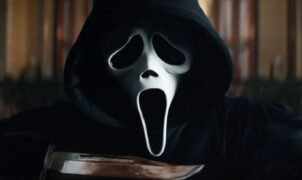
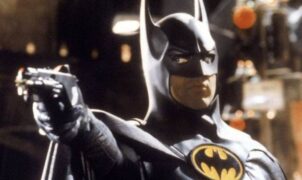


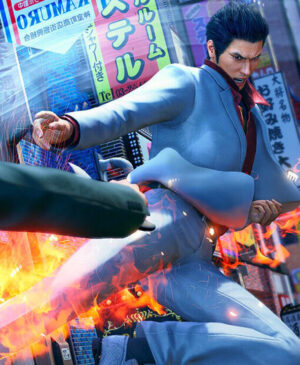



Leave a Reply